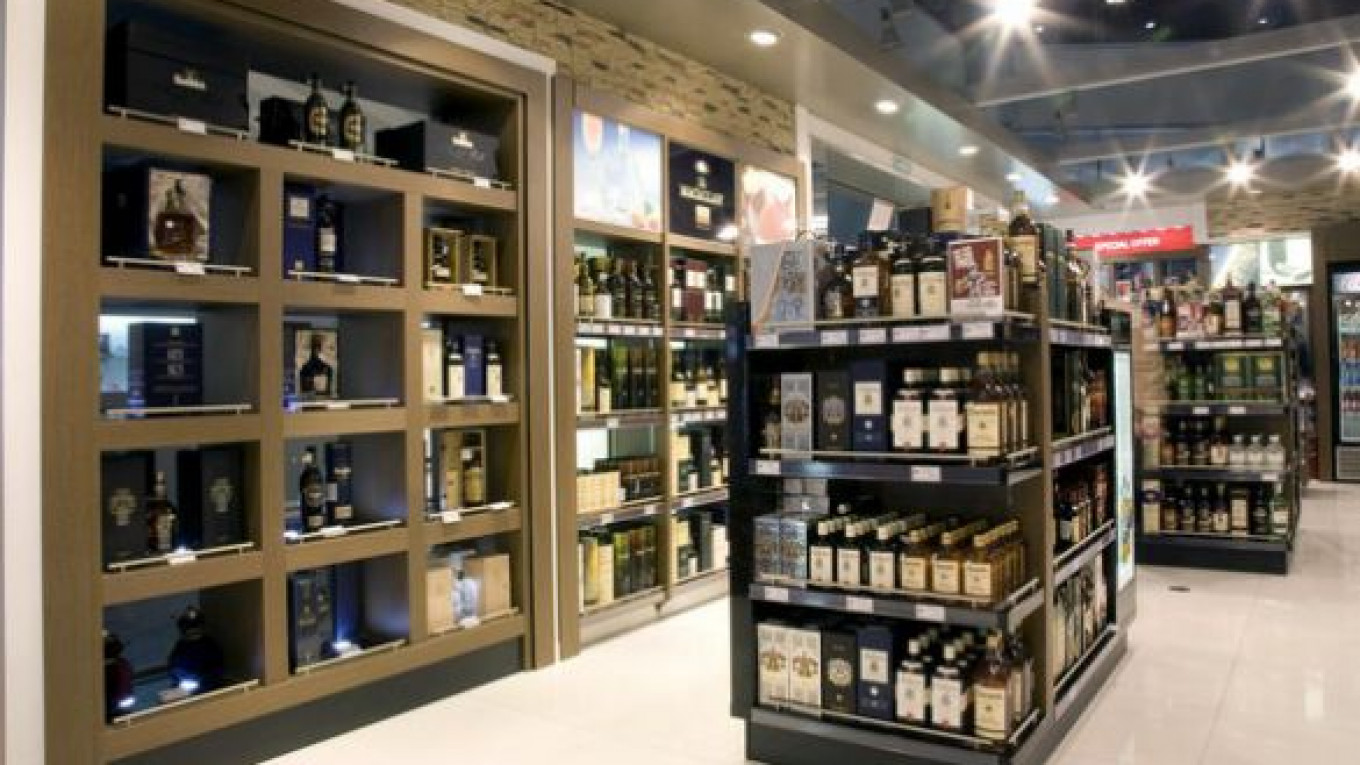Aviation professionals and consumer rights activists have reacted with bemusement to plans to ban passengers from carrying duty-free alcohol on board airplanes.
The transportation minister is pushing amendments to the Aviation Code to stop passengers from carrying alcohol on board in order to stop violent behavior caused by drinking, Rossiiskaya Gazeta reported Monday citing a ministry source.
While passengers will still be able to drink alcohol served on board, drinks bought by passengers before boarding would be collected by flight attendants and returned to them after the end of the flight.
Passengers who buy duty-free alcohol on board would only be able to collect the bottles from the crew after landing.
While fines for violent and abusive behavior have been increased from 100 rubles ($3) to 1,500 rubles in 2009, Russian air carriers report that alcohol-fueled violence among passengers is actually on the rise, the paper claimed.
The explanatory note released along with the bill said Aeroflot has reported more than 1,000 incidents of disorderly behavior among passengers since 2009, "most of which" were linked to alcohol.
Roman Gusarov, the head of Avia-Ru Network industry portal called the measure "understandable":
"Drunk passengers cause a lot of problems to airlines," said Gusarov.
Drunken air passengers have contributed several high-profile incidents and produced some spectacular YouTube videos in recent years.
In October, a 22-year-old man was arrested after he told fellow passengers as their S7 jet was preparing for takeoff from Petropavlovsk-Kamchatsky that a bomb was hidden on board the aircraft. No bomb was found after a search.
In 2010, Alexei Beketov, a lawmaker representing Tikhvin in the Leningrad region, started a fight with a flight attendant while flying to Paris as a member of an official delegation. The deputy was drunk, members of the Rossia airline said at the time.
Last year a BMI flight to London had to return to Domodedovo shortly after takeoff when a drunken female passenger started performing erotic dances in the aisles.
And it is not just passengers who are given to misbehaving.
In 2004, two intoxicated flight attendants were accused of beating up a passenger who complained they were in no condition to do their job on an Aeroflot flight from Moscow to Nizhnevartovsk, while in 2009 an Aeroflot pilot was removed from a New York-bound plane in Moscow after passengers, including socialite Ksenia Sobchak, accused him of being drunk. The airline later said tests revealed no signs of intoxication and the pilot might have suffered a stroke.
In a more serious incident, a drunk navigator was blamed for an air crash near Petrozavodsk that killed 47 people in 2011.
Airline professionals interviewed by The Moscow Times were skeptical about the utility of the new law, however.
"No, we don't need prohibition on board," said Miroslav Boichuk, president of the Russian Pilots Union.
"If we see a problem we will deal with it. If things are run properly and according to [current] law that should not be a problem," he said by telephone, though he conceded that heavy-drinking passengers do not make cabin crew's jobs any easier.
He also claimed the problem of drinking among aircrew had been exaggerated by the media.
"The press has got hold of a single example — this incident at Petrozavodsk — and blown it out of proportion," he said.
A spokesman for Transaero, the country's largest privately-owned airline, said the law would make no difference to current practice.
"We already ban passengers from opening any alcohol bought duty free; and we don't let passengers on board if they are in a drunken or disruptive state; so for us this doesn't make any difference whatsoever," a spokesman said.
He declined to offer statistics on the number of drunken air rage incidents the airline faces on a yearly basis or to identify any particularly problematic routes or time of year.
"It's not proper to talk about that. It happens. It's not just our problem, it is something faced by all airlines," he said.
Consumer rights groups immediately denounced the move.
"Airlines just want to sell more alcohol, with a high percentage," Mikhail Anshakov, head of the Society for Consumer Rights Protection, told the Russian News Service radio. "Their alcohol is two to three times more expensive than [that purchased] duty free.
"Troublemakers who consume too much alcohol get rowdy and must be dealt with. Nobody prevents airlines in the existing legal system to deal with them," he added.
"They just want to make their own lives simpler and make passengers' lives more difficult," he added.
A spokeswoman for Aerofirst, which runs duty free shops at Sheremetyevo airport, declined to comment Monday.
Other proposals outlined in the law include installing bullet-proof doors and granting cabin crew and airline security the right to use "physical force" to restrain offenders, Interfax reported.
Related articles:
A Message from The Moscow Times:
Dear readers,
We are facing unprecedented challenges. Russia's Prosecutor General's Office has designated The Moscow Times as an "undesirable" organization, criminalizing our work and putting our staff at risk of prosecution. This follows our earlier unjust labeling as a "foreign agent."
These actions are direct attempts to silence independent journalism in Russia. The authorities claim our work "discredits the decisions of the Russian leadership." We see things differently: we strive to provide accurate, unbiased reporting on Russia.
We, the journalists of The Moscow Times, refuse to be silenced. But to continue our work, we need your help.
Your support, no matter how small, makes a world of difference. If you can, please support us monthly starting from just $2. It's quick to set up, and every contribution makes a significant impact.
By supporting The Moscow Times, you're defending open, independent journalism in the face of repression. Thank you for standing with us.
Remind me later.






